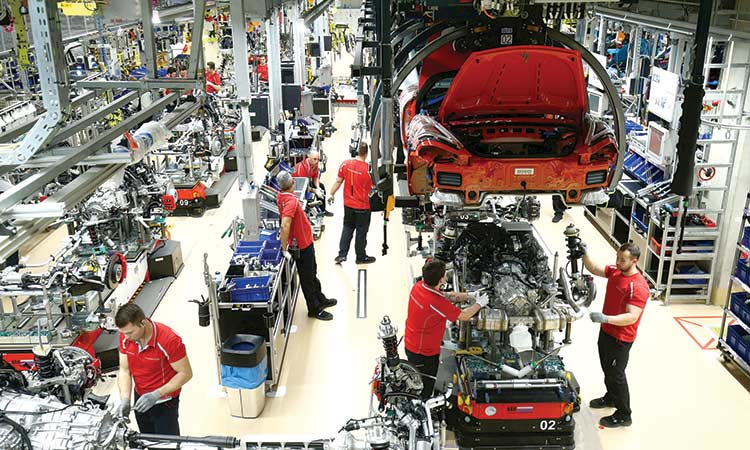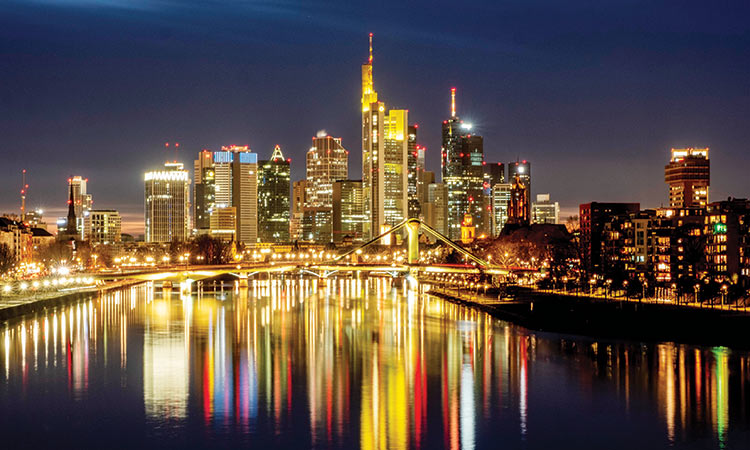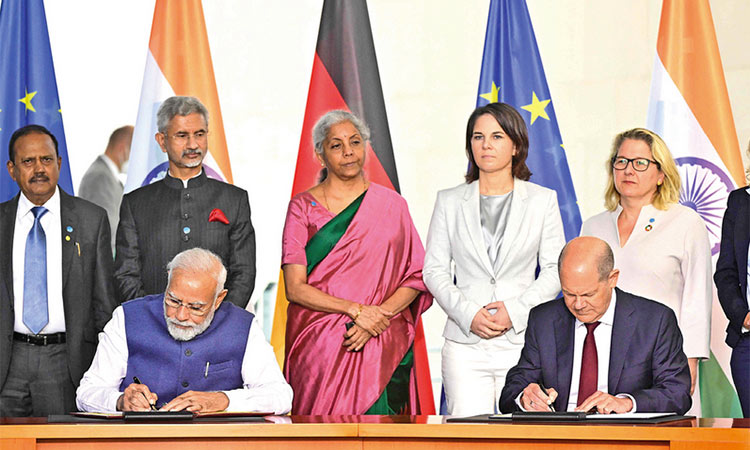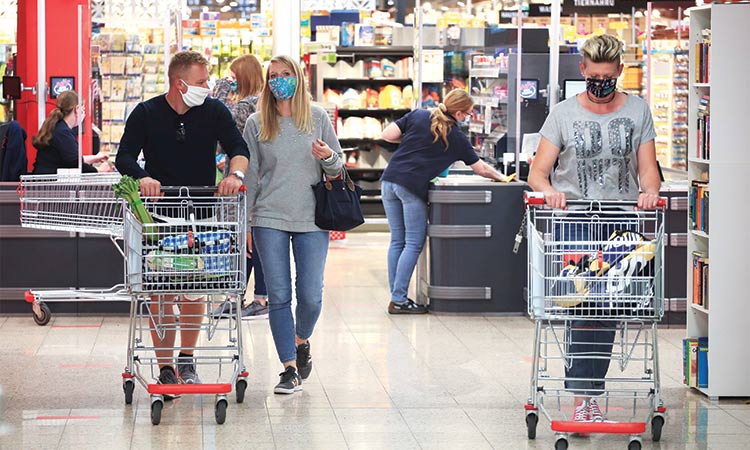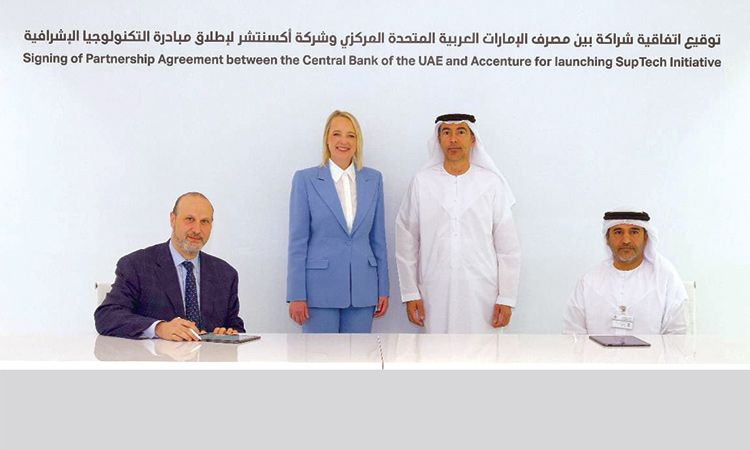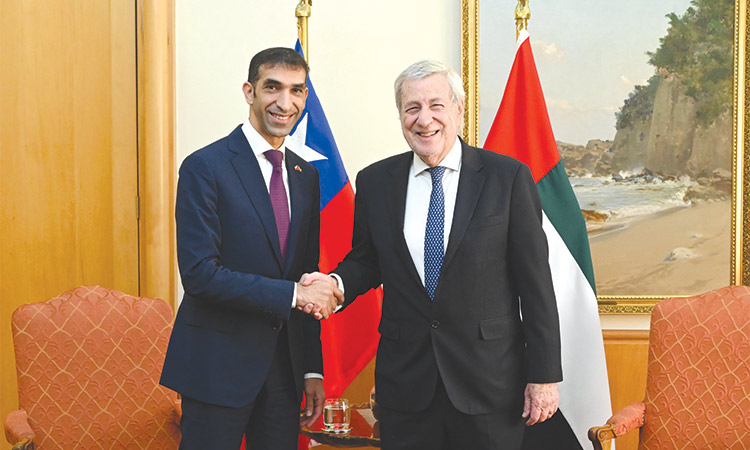German business morale rises as economy shakes off virus crisis

The skyline with its financial district is photographed during sunset in Frankfurt, Germany. Reuters
The Ifo institute said its business climate index rose to 101.8 from 99.2 in May. A Reuters poll of analysts had pointed to a June reading of 100.6.
“The German economy is shaking off the coronavirus crisis,” Ifo President Clemens Fuest said in a statement.
Chancellor Angela Merkel said on Wednesday Germany was on the verge of a strong economic upswing, adding that Bundesbank chief Jens Weidmann had given a very positive assessment of the economic outlook to the cabinet.
Germany’s central bank raised its growth forecasts earlier this month and now expects the economy to reach pre-pandemic levels as soon as next quarter and grow by 3.7 per cent this year and 5.2 per cent next year.
German authorities have loosened COVID-19 restrictions in light of falling infections and higher vaccination numbers.
The bounce-back from lockdown is driving the largest upward leap in retail conditions seen since German reunification more than three decades ago, Ifo economist Klaus Wohlrabe said.
“The German economy is currently in excellent shape,” said Thomas Gitzel, economist at VP Bank Group.
“However, the pandemic is still not completely eliminated as an economic stumbling block. The Delta variant worries not only virologists but also economists,” he added.
The share of COVID-19 infections caused by the more easily transmitted Delta variant of the coronavirus has doubled in Germany in a week and is likely to gain more traction over other variants, the Robert Koch Institute public health agency said on Wednesday.
Meanwhile the Government bond yields in the euro area drifted higher on Thursday, pushed up by brighter prospects for the bloc’s economy.
In Germany, the eurozone’s benchmark bond issuer, 10-year yields have risen around 12 basis points from lows hit a day after the European Central Bank’s reaffirmed its dovish policy stance at a June 10 meeting. A hawkish shift by the US Federal Reserve last week added to upward pressure.
A Bank of England meeting later on Thursday could further push up bond yields if policymakers suggest that massive stimulus could be taken away sooner than expected as the economy bounces back from the COVID-19 shock.
In early trade, most 10-year bond yields were up around one basis point on the day, with Bund yields 1.2 bps higher at -0.17 per cent.
Analysts expect signs of a strengthening economy to keep upward pressure on borrowing costs. On Wednesday, IHS Markit’s Flash Composite Purchasing Managers’ Index, seen as a good guide to economic health, jumped to 59.2 in June from 57.1, its highest reading since June 2006.
Germany’s closely-watched Ifo business sentiment survey is released later on Thursday.
“Bond markets appear to have found a new balance after the Fed-induced volatility eruption last week,” said Christoph Rieger, head of rates and credit research at Commerzbank.
“While Bunds stabilised, the long-end curve re-steepened further and (inflation) break-evens re-widened, suggesting that fundamentals are slowly taking over from positioning again.”
The five-year, five-year breakeven inflation forward, a market gauge of long-term inflation expectations in the euro area, rose to 1.56 per cent on Wednesday.
That’s up sharply from almost two-month lows hit last week.
Elsewhere, Italy was expected to launch a new CCTeu bond, due April 15, 2029 via a syndicate of banks.
“The maturity of the new floater will be longer than usual. In our view, this reflects Italy’s objective of lengthening its debt maturity,” analysts at UniCredit said in a note.
Italy’s 10-year bond yield was last up almost one basis point at 0.90 per cent.
Meanwhile the German parliament’s budget committee on Wednesday approved a 4.5 billion euro deal for the next steps of the development of a Franco-German fighter jet, a parliamentary source said.
Dassault Aviation, Airbus and Indra are involved in the scheme to start replacing France’s Rafale as well as German and Spanish Eurofighters from 2040.
At an estimated cost of more than 100 billion euros ($118.83 billion) in total, the development of the jet is Europe’s biggest defence project. It brings together Germany, France and Spain.
